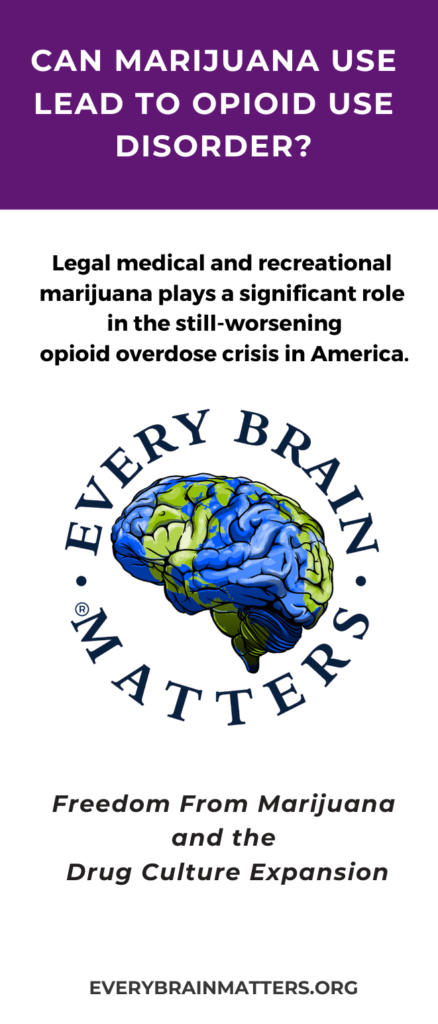Legal medical and recreational marijuana plays a significant role in the still-worsening opioid overdose crisis in America.
PUBLIC HEALTH CRISIS IN AMERICA
If supporters of marijuana are correct, then as more states continue to decriminalize and legalize marijuana use, we should see a corresponding decrease in the number of fatal opioid overdoses.
But opioid deaths are continuing to climb at an alarming rate. According to the Centers for Disease Control and Prevention, over 100,000 drug overdose deaths in America during the 12-month period ending April 2021, a 29% jump from the year before.
As a country, we urgently need to realize that while the opioid epidemic is fueling the overdose crisis, that epidemic is in large part fueled by unprecedented marijuana availability, potencies, and use.
Only then can we take the proper steps to break the cycle and save lives.
Do opioid-related emergencies decrease in areas where recreational marijuana has been legalized?
No. CURRENT data from legalized states are showing that the opposite is actually true. April of 2022 Science Direct states “… marijuana legalization has contributed to the U.S.’s opioid epidemic in all major races/ethnicities, and especially in blacks.”
https://www.sciencedirect.com/science/article/abs/pii/S0027968422000529
Do opioid overdose deaths decrease in medical marijuana legal states?
No. Opioid overdose mortality rates increased by 23% in states with legal medical marijuana.
resources: https://www.pnas.org/doi/10.1073/pnas.1903434116
Does marijuana treat pain?
The FDA has not approved marijuana as a pain medication.
- 2017: A review of 27 published studies on marijuana and chronic pain found “low strength evidence“ that it relieves nerve pain but does not help with other kinds of persistent pain.
- 2019: Cannabis showed inconsistent results when treating the pain from rheumatic disorders and neuropathic pain, and was not effective at all at treating chronic cancer pain.
- 2021: A review of 32 clinical trials found that non-inhaled marijuana had little effect on chronic pain.
resources: https://www.acpjournals.org/doi/10.7326/M17-0155 https://www.ncbi.nlm.nih.gov/books/NBK546424/ https://onlinelibrary.wiley.com/doi/10.1002/hec.4377
Could the use of marijuana potentially help people with Opioid Use Disorder and ease cravings?
One of the most concerning dangers of marijuana is how it can trigger other drug use. For those trying to recover from illicit heroin, prescription pain medications, or synthetic opioids like fentanyl, cannabis use can directly lead to relapse.
A study published earlier this year in Emerging Trends in Drugs, Addictions, and Health found that young people with OUD who attempted to use marijuana as a “safer” substitute for their chosen opioid were unsuccessful in their recovery. Because smoking marijuana actually intensified their cravings for opioids, they were much more likely to relapse into active use.
Quotes from the subjects in this study stated:
“Weed was just not enough, and it accelerated my need for a heroin high.”
“Smoking weed was like a little tickle, and started the cravings for heroin in motion.”
“If I’m already getting high, I might as well get REALLY high, because opiates are better.”
“Each time I relapsed on weed, I would immediately think heroin is so much better.”
resource: https://www.sciencedirect.com/science/article/pii/S266711822100009X
Can marijuana use lead to opioid abuse?
- Early initiation of marijuana is a dominant predictor of Opioid Use Disorder.
- A 2018 study published in the Journal of Addiction Medicine found that individuals who use medical marijuana have significantly higher rates of medical and nonmedical use of prescription drugs than those who do not use medical marijuana.
- Young adults who smoke marijuana are two-and-a-half times more likely to misuse prescription medications than their abstaining peers. This is significant as 80% of heroin addicts started out by abusing prescription opioid painkillers.
- National Institute on Drug Abuse reports that people who use marijuana are more than twice as likely to be dependent on or addicted to prescription opioids and six times more likely to take pain pills.
https://www.sciencedirect.com/science/article/abs/pii/S0376871620300041 https://pubmed.ncbi.nlm.nih.gov/29664895/

